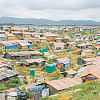Rohingyas in No-man's Land: Life laden with fear, worries
Every dawn, Hamida's two-year-old girl wakes up and cries, hearing the sound of Myanmar army's heavy vehicles. She grabs her mother tightly out of fear. And the soldiers fire shots in the air, terrifying Rohingyas living in no-man's-land. This has been going on for the last three months at Tombru along Bangladesh-Myanmar border in Bandarban's Naikkhangchhari.
Due to the continuous patrolling by the Myanmar army along the border, the Rohingyas are haunted by fear that the army could attack them.
“I lost all my family members except the child in the violence [persecution of Rohingyas by the Myanmar army] at Laiya village of Maungdaw. When I see the same army, who killed my family members, just near my tent, I can't sleep anymore,” a traumatised Hamida told The Daily Star at Tombru.
Rohingyas living there allege that the army is continuously planting landmines along the border and threatens any Rohingya they come across on the other side of the barbed-wire fence.
At least 6,000 Rohingyas have taken shelter in the no-man's-land since late August when the Myanmar army launched a brutal crackdown against Rohingyas in Rakhine State.
Villagers from Deybuinna, Raimongkhali, Medi, Tombru, Laipuiya, Ponduiya, Khuyangcipong and Panirchora of the state's Maungdaw are currently living there.
“They [Myanmar army] are still threatening us not to come back to our ancestral land when they patrol along the border. Otherwise, we have to face dire consequences,” said Sayed Salam of Khuyangcipong village.
Rohingya people sometimes enter Myanmar to collect dry wood and to see the condition of their arable land, not far from the border, and they fall victims to landmine explosions that leave them injured or dead.
Salam's grandson was wounded in such an explosion a few days ago while crossing the border into Myanmar to see his paddy field, he added.
Salam alleged that the army sometimes detains the injured and kills them.
"We saw them [Myanmar army] planting the landmines along the border. So, when we enter Myanmar, we try to avoid those places where the landmines are laid," said Mohammad Siddik of Deybuinna village.
During a recent visit to the border area, this correspondent found that trucks carrying soldiers were going past the border area.
"The appearance of the truck with ammunition makes our blood run cold as this is the army who killed our men, raped our women, burnt our homes and looted our valuables and crops," Dil Mohammad, a graduate from Yangon University, told this correspondent.
Locals and BGB do their best to help them. Even their pregnant women give birth to children at locals' houses, he added.
Bangladesh Red Crescent Society is providing the Rohingyas with food and first aid.
Talking to The Daily Star, Abul Kalam, who opened his door to the refugees from the very first day of their arrival at Modhyampara along Tombru border, said at least 100 Rohingya women gave birth with the local women's help at his house.
The army tries to frighten them by exploding bombs and firing bullets as if it is their offence to help the Rohingyas, he added.
According to an UN estimate, over 622,000 Rohingyas have taken shelter in Bangladesh to escape persecution in Myanmar since August 25.

 For all latest news, follow The Daily Star's Google News channel.
For all latest news, follow The Daily Star's Google News channel. 








Comments